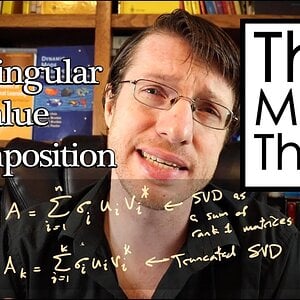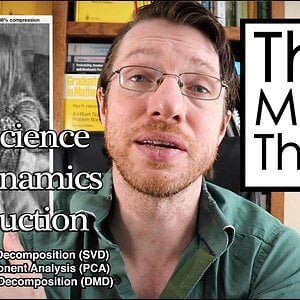You are using an out of date browser. It may not display this or other websites correctly.
You should upgrade or use an alternative browser.
You should upgrade or use an alternative browser.
Recent content by AcademicOverAnalysis
-

Lecture 5a - Pandemic Pedantics - Derivation of PCA and Kernel PCA
Here we talk about how we come to the formulas for PCA and Kernel PCA. We briefly introduce kernel functions, and talk about feature spaces. This builds on the introductory lecture for PCA and also that for Kernel PCA.- AcademicOverAnalysis
- Media item
- Data science Pca Proof
- Comments: 0
- Category: Misc Math
-

Lecture 5 - Science, Toys, and the PCA
We open this lecture with a discussion of how advancements in science and technology come from a consumer demand for better toys. We also give an introduction to Principle Component Analysis (PCA). We talk about how to arrange data, shift it, and the find the principle components of our dataset.- AcademicOverAnalysis
- Media item
- Data science Linear algebra Pca
- Comments: 0
- Category: Misc Math
-

Lecture 4 - Headaches from math - Saving lives with the SVD
Here we review the mathematics that goes into CT scanners and the inversion of the Radon transform. The approach given here uses the Moore-Penrose pseudo inverse to invert a tall and skinny matrix. We can get a nice representation of the pseudo inverse by using the singular value decomposition (SVD)- AcademicOverAnalysis
- Media item
- Medical imaging Svd
- Comments: 0
- Category: Misc Math
-

Lecture 3 - How SVDs are used in Facial Recognition Software
This video builds on the SVD concepts of the previous videos, where I talk about the algorithm from the paper Eigenfaces for Recognition. These tools are used everywhere from law enforcement (such as tracking down the rioters at the Capitol) to unlocking your cell phone.- AcademicOverAnalysis
- Media item
- Data science Linear algebra Svd
- Comments: 0
- Category: Misc Math
-

Lecture 2 - Understanding Everything from Data - The SVD
In this video I give an introduction to the singular value decomposition, one of the key tools to learning from data. The SVD allows us to assemble data into a matrix, and then to find the key or "principle" components of the data, which will allow us to represent the entire data set with only a few- AcademicOverAnalysis
- Media item
- Data science Linear algebra Pca Svd
- Comments: 0
- Category: Misc Math
-

Lecture 1 - Data Driven Methods in Dynamical Systems
This is an introductory video for my class on data driven methods in dynamical systems theory. We will cover topics including SVDs, FFTs, DMD, PCA, and many other acronyms.- AcademicOverAnalysis
- Media item
- Data science Fft Graduate Svd
- Comments: 0
- Category: Misc Math
-

Dynamical System Inner Products and Projections with Liouville Operators (Koopman Generators)
In this video we show how we can exploit the linearity in the symbol of Liouville operators to define an inner product on dynamical systems that give rise to densely defined Liouville operators over a reproducing kernel Hilbert space (RKHS).- AcademicOverAnalysis
- Media item
- Dynamical systems
- Comments: 0
- Category: Misc Math
-

Operators for (Nonlinear) Dynamical Systems
Koopman Generators, Liouville Operators, and Transfer Functions! We talk about the role of operators in Dynamical Systems theory. This requires a discussion of Hilbert spaces, Densely Defined Operators, and Occupation Kernels.- AcademicOverAnalysis
- Media item
- Control theory Dynamical systems
- Comments: 0
- Category: Misc Math
-
A
DMD is better without Ergodic Theory and Koopman Operators
Hello everyone! This is my first post here. I am trying out an argument that I've been sculpting, and I thought this might be a good community where I can get some good feedback. My work is in data driven methods for dynamical systems, and in particular, I am an operator theorist. I have been...- AcademicOverAnalysis
- Thread
- Replies: 2
- Forum: Topology and Analysis